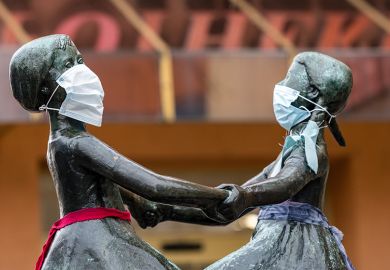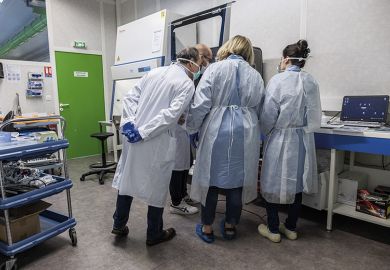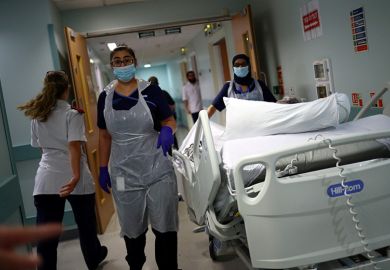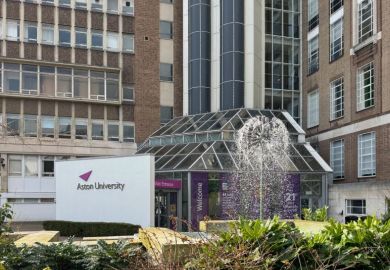Concern over coronavirus has largely shuttered academic lab activity not related to the pandemic. Yet university faculty remain broadly engaged in research work, with growing optimism that behaviours learned in the battle against the virus will bring useful long-term benefits through changes to research culture.
Even labs open for coronavirus-related work face severe limits on how many people can come inside at a time. Scientific conferences, research in remote locations and work with lab animals and plants have all become largely impossible.
“Essentially everything is being disrupted, in some way or another,” said Michael Lauer, the top official in charge of grant awards at the National Institutes of Health, the leading US funder of basic scientific research.
But much work continues, said Nevan Krogan, a professor of cellular molecular pharmacology at the University of California, San Francisco, and the urgency is helping to topple some harmful academic silos and practices along the way.
Before Covid-19 arrived, Professor Krogan studied basic biological mechanisms as a means of finding commonalities and cures involving a variety of diseases. He quickly switched course in late January, and used his lab’s expertise and global partnerships to compile a list of 300-plus human proteins that the virus appears to target, before his campus closed in mid-March.
The virus left no time for the niceties of signing former contracts for transferring materials. “We were just forgoing that, just ignoring the lawyers, just getting this out,” he said.
More important behavioural shifts in academia, Professor Krogan said in an interview, include the growing sense of mission taking priority over individual credit, and the spreading realisation of ways in which one field can benefit another.
Colleagues pursuing cancers and neurodegenerative diseases, for instance, are seeing some of the same genes they study “being hijacked and mutated by coronavirus”, he explained further at a National Academies forum on the pandemic.
“We’re going to be so much better off in 10 years because of this event – we’re learning how to work together here,” Professor Krogan said. “This is so valuable you cannot put a price on that.”
The emergency, said Rebecca Cunningham, vice-president for research at the University of Michigan, is driving cross-disciplinary advances in areas that include behavioural counselling, substance abuse and smoking cessation, and online doctor visits.
“Here we have the opportunity to suddenly move in a way that is not incremental, but really radical,” Dr Cunningham, a professor of emergency medicine, told the National Academies event.
Both the NIH and the National Science Foundation have created channels for scientists to get funding for virus-related work or reallocate existing awards. The scientific opportunities of the moment, however, are extending well beyond directly fighting the disease.
Current research topics include the effects of reduced human activity on wildlife and the planet’s overall environment; economic comparisons with the damage of past pandemics; the health effects of ignoring economic disparities and racial bias; and the effects of home confinement on domestic violence.
Scientists of all fields are being forced to become more creative, cooperative and resilient. Astrophysicists are devising ways to manage their projects from afar; engineers and computer scientists are tracking and predicting disease spread; and medical experts are learning new ways to triage and crowdsource.
Dr Lauer said he’s been impressed by the overall response of the research community, but had not had time during the crisis to consider any policy changes that could help make the changes more permanent.
“That’s something that we’re going to look at later,” he said.
Register to continue
Why register?
- Registration is free and only takes a moment
- Once registered, you can read 3 articles a month
- Sign up for our newsletter
Subscribe
Or subscribe for unlimited access to:
- Unlimited access to news, views, insights & reviews
- Digital editions
- Digital access to THE’s university and college rankings analysis
Already registered or a current subscriber?








